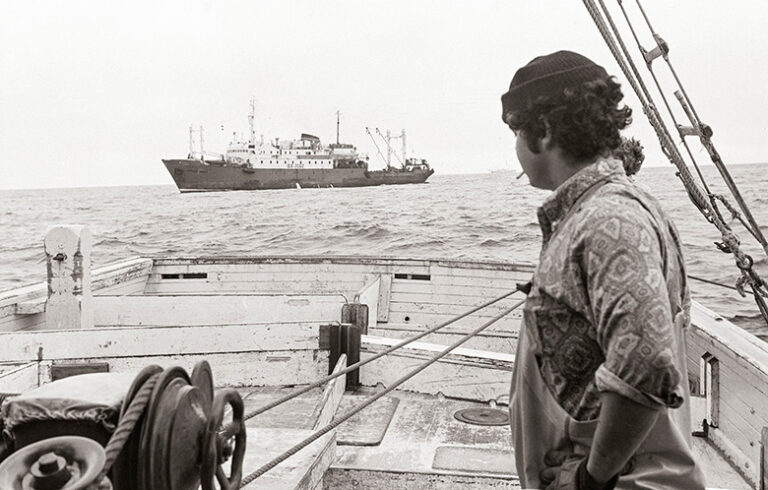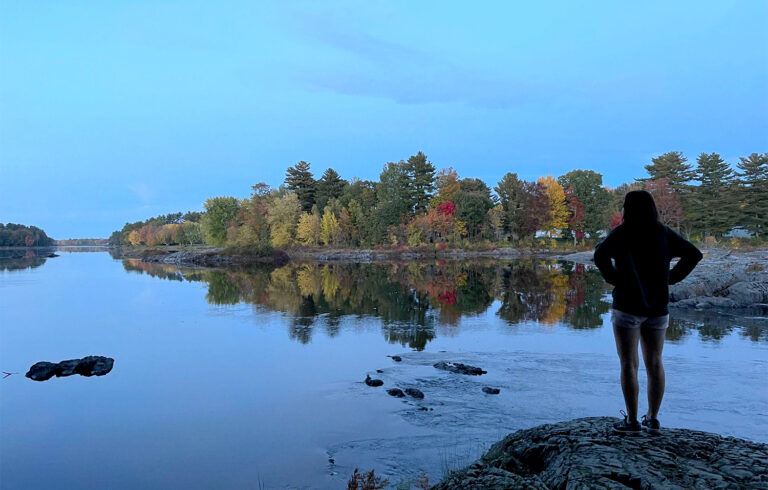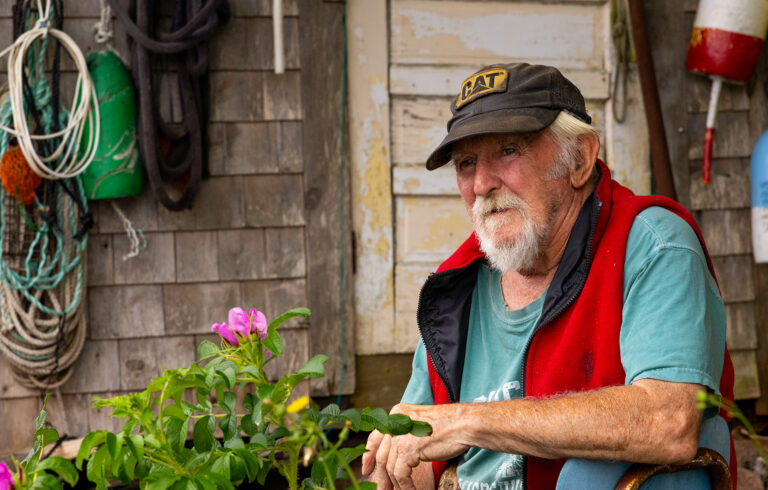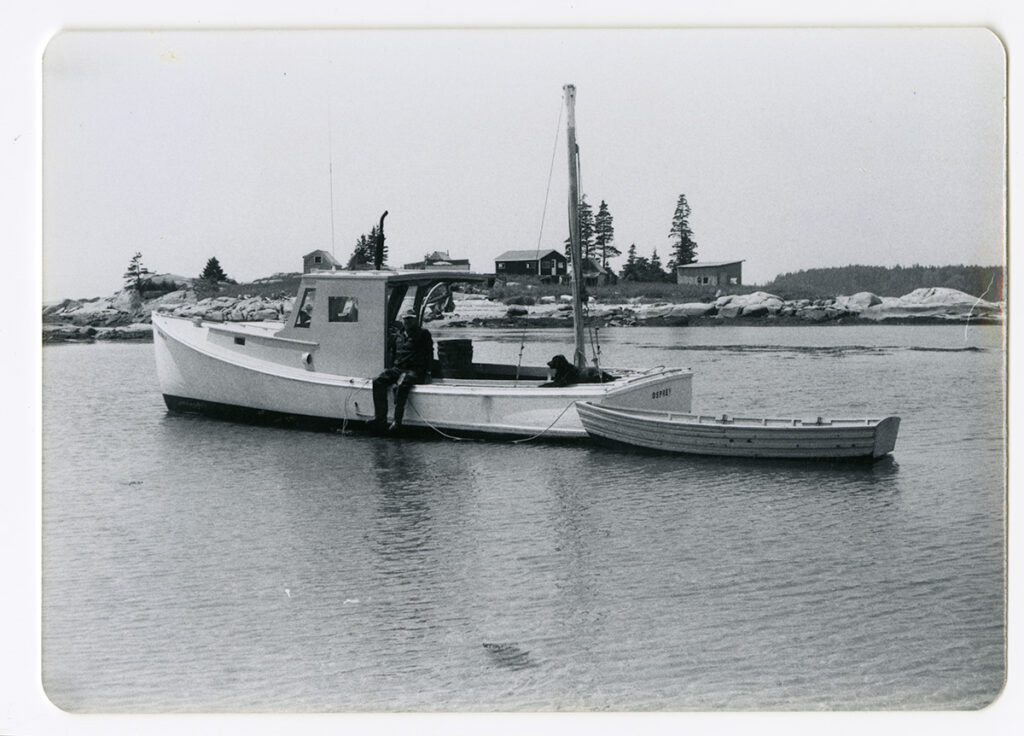
My lobstering career started the day old Chet Wall cut off a finger while repairing wooden traps in our barn. It was mid-July, the height of one of the best lobster seasons we’d had in years.
Chet had been working for my father, lobstering around Pleasant Island. Daddy supplied him with boat, gear and a place to stay on the island in return for half the profits. My father was willing to give Chet a chance, even though some (including my mother) considered him an old drunk. He had the reputation of working a job just long enough to earn beer money, then going off on a toot until he ran out of both. Daddy knew he couldn’t really depend on him, but he needed help hauling in all those lobsters. The shedders were coming in faster than he could catch them, and the days just weren’t long enough. Most of Chet’s traps were in and around The Puddle, a shallow area rimmed by Two Bush, Pleasant and Crow Islands in the Mussel Ridge Channel off Spruce Head. About 15 of his traps were close to shore in the back cove. If Daddy could just get someone to haul those, it would be a big help. So Daddy approached me with a proposition.
“Kaff, do you think you might be interested in taking over some of Chet’s traps? I can’t handle ’em all. He’ll be laid up all summer and we’re right in the middle of the best shedder season.”
He was willing to supply all the bait and everything else I needed, so I took the job. But there were strings attached. I was only 11 years old, and he didn’t want me out there alone. Mama would have to go with me. She would row the skiff and I would pull in the traps. Both Mama and I were excited and ready to start our new careers.
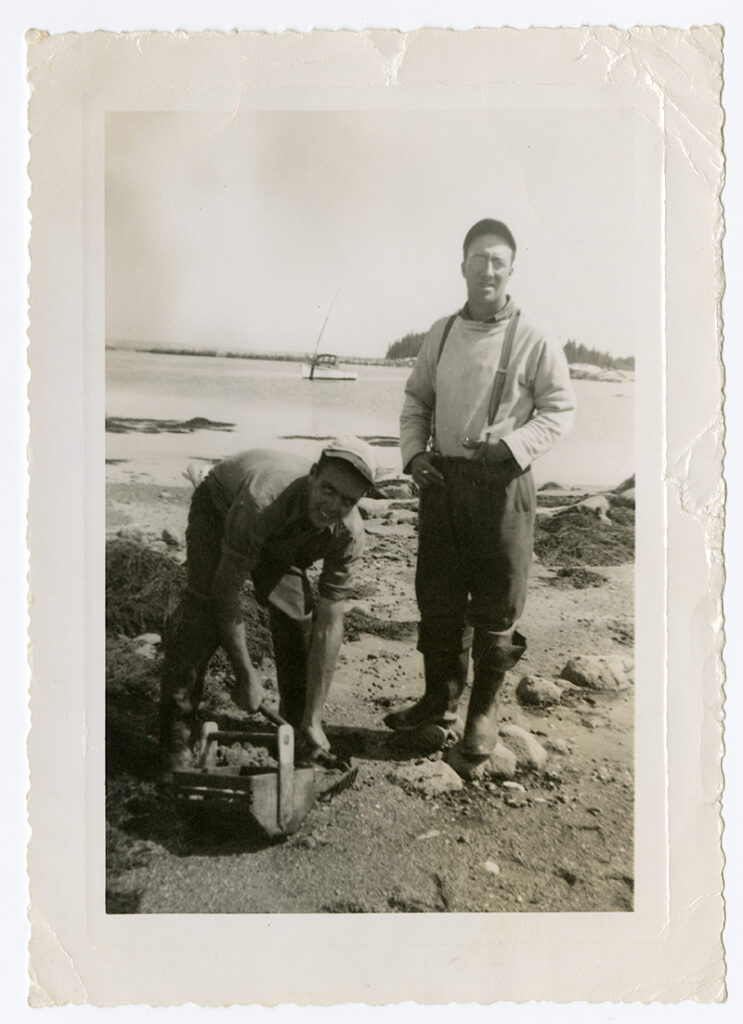
At first it was fun just to see what was in the traps when I pulled them up. We never knew what we’d find. There were big lobsters, small lobsters (called snappers), lots of crabs, sea urchins and plenty of kelp. I struggled to pull in the heavy traps. Sometimes the warp got tangled with another trap, making it almost impossible to haul them both up to untangle them. Even though I’d try to be careful not to set my traps too close to each other, the wind and the tide had a way of pushing them together. Leaning over the side and separating the ropes, slimy with kelp, was like working on a yucky underwater puzzle. When I’d finally get the trap close to the surface, I’d kneel down against the inside of the dinghy so the gunwale was even with the water, then I’d give one big yank until the trap almost landed in my mother’s lap. Along with the trap, of course, would come buckets of seawater that I had to bail out while Mama rowed toward the next buoy. If we had any lobsters (and we usually did), I had a hard time pulling them out at first, until I got used to handling them. I was sure that one of those big claws would grab my hand with a death grip and cut off a finger or two. Daddy told me that if you shook your hand to get it off, he’d just hold on tighter. “Try to let it hang from your hand,” he said, “no matter how much it hurts.” He said the lobster would let go as soon as it felt its own weight. Luckily, I never had to test his advice. I also never heard of anyone losing a finger from a lobster.
We used redfish for bait when we could get them, and that was most of the time. They’d been filleted, so what was left of them were the heads connected to the tail by bones. Part of my job was to run a bait iron through their eye sockets, then thread the eye of the bait iron with nylon string, hanging from inside the trap door, as if I was threading a giant needle. I could do that part pretty fast, but then Mama and I would argue over where we should set the trap back—our operation took so long that we’d have drifted away from where we’d first pulled it up. High tide made it even worse—it was a whole lot harder for me to haul up those heavy traps.
One time we came around the corner of the island at low tide and saw one of our traps sitting high and dry on a ledge. We’d hauled three days before, when water had covered it. When Mama pulled up to the side of the ledge, I stepped out of the boat and clomped over to the trap, hoping no one would see me. Inside was a lobster so big we didn’t even have to measure it to be sure it was legal (a “counter”). We laughed over that, wondering whether anyone had gone by and noticed where some fool had set his . . . or her . . . trap.
I had other problems besides being slow at hauling my traps. Seasickness hit me every time I went out. The boat was moving up and down, and swaying back and forth. After about three traps, I’d start getting dizzy every time I looked down at what I was doing. By the fourth trap, I was feeding the fishes. After that, I felt better for a couple more traps, until it started all over again. When we got back ashore on the island and had the skiff tied on the pulley line, I’d walk up the hill to our camp, kick off my boots, and climb the ladder into my top bunk. It was cozy up there next to the spruce rafters, with my quilt pulled over me, and I’d fall asleep instantly. When I woke up, I’d feel fine again. Everyone in my family and even old Mr. Post on Mink Island gave me advice on how to avoid seasickness. Mr. Post said to take a tablespoon of molasses every morning before I went out. Grandpa told me not to eat before I went. Daddy told me to eat a big breakfast—and he also told me I’d get over it. Nothing worked. I continued to get sick every time I went. It sure wasn’t anything to look forward to, even with the money I was making.
Ah, yes, the money. Mama decided that with all the lobsters we were catching, she should have half the proceeds. I argued that I was doing all the work and the suffering, and all she was doing was rowing. Daddy settled the argument by giving Mama a third.
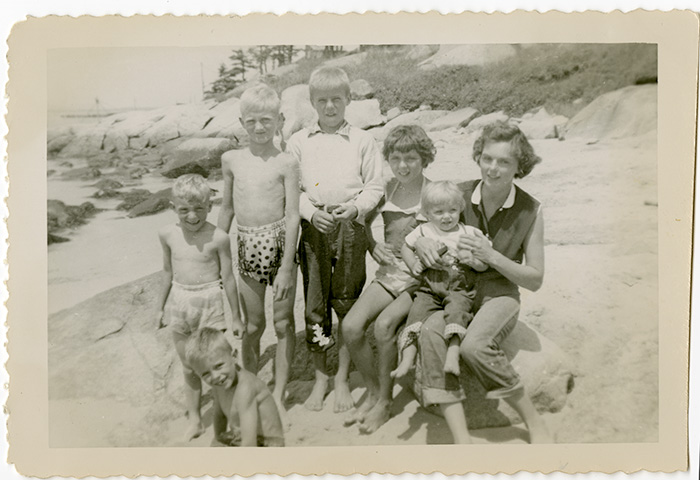
We managed to finish that summer, and by the next year the agony was forgotten—I was sure I wouldn’t get sick. After all, I had turned 12. So we started again with a new license and my own traps. But Daddy decided I was still too young to go out alone.
That left Mama and me again; same deal. Old Chet Wall was back lobstering in The Puddle, but there was room for all. I still got sick, but I was much too greedy to stop. I kept my own crate of lobsters tied off Daddy’s mooring and we went to the mainland to sell once a week—unless the price went up, in which case we’d go in and sell ’em the same day.
Daddy always double-checked my lobsters to be sure they were legal. He usually found at least one or two that I hadn’t looked over or measured right. I’d even been known to let an egg-bearing seeder lobster slip by, unnoticed. One time, at the end of a busy week, we were taking many crates to sell. Daddy was tired from hauling them all up onto the stern of his boat from his mooring, and he’d forgotten to double-check my lobsters. As we came around Burnt Island and approached the buying station in Spruce Head, we could see the warden on the float, checking lobsters. Suddenly Daddy remembered me and my crate. He stopped his boat and started to go through my lobsters. He found some “shorts” and was quickly throwing them overboard, swearing with each one he threw. I couldn’t believe it. “Are you sure, Daddy? I thought that one was okay.” He just glared at me.
“Oh, Daddy, I was sure that one went.” I was almost in tears, seeing some of my week’s profits flying back into the ocean.
“What the hell are you trying to do to me—put me in jail?” His red face glowered at me as he snapped my crate closed. “You need another lesson in measuring lobsters, Kaff. You can’t put short lobsters in your crate and expect them to grow while you sleep.”
My father was always the one who decided whether or not it was too windy for us to go out. Our camp was on the south side of the island, facing Mink Island, so Mama and I couldn’t tell whether the wind was bad or not. But Daddy always knew what the wind was up to, and he was always right. One early morning, he left to go out to haul after telling us to stay home because it was blowing too hard for us to be out, but Mama and I decided it looked calm enough to us. So we decided to go anyway. We figured he’d come home that afternoon and say he’d been wrong, and we could’ve gone. Maybe he worried too much for nothing.
As soon as we rowed around the corner from the wharf at the end of the island, the wind hit us full in the face. There were whitecaps everywhere. It was as different as night and day from the front side of our island. We struggled hard, just trying to get to the first trap. I had to grab one of the oars from Mama, to help row. The current was against us and the wind was blowing our dinghy backward. We even had to grab someone else’s buoy to hold us while we caught our breaths. We were both getting tired and ugly and should have quit right then. Mama looked around at the angry ocean, her eyes wide.
“Let’s go back. This is terrible.”
“But we’re so close,” I said. “I think we should at least haul one.” I tried to be as brave as I thought Daddy would have been. But the dinghy was taking on a lot more water than usual. Mama tried to row up as close as she could to our buoy. I got ready to gaff it, knowing I only had one chance. If I missed the buoy, Mama wouldn’t try another time. I leaned out over the boat.
“Be careful!” she hollered. “Don’t lean out too far. You’ll go overboard.”
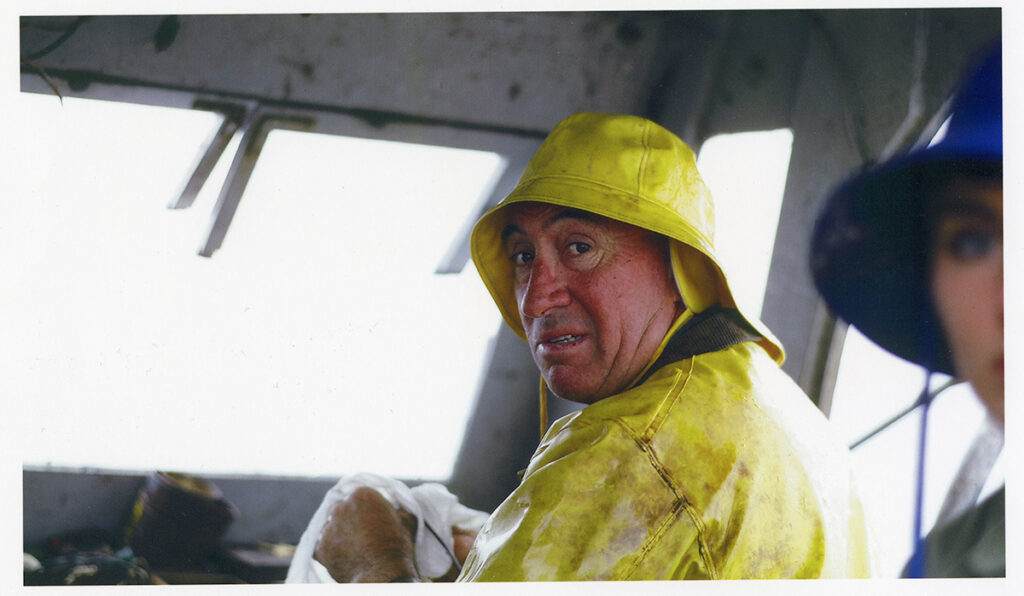
Somehow I managed to snatch up the rope attached to our buoy and started hauling. Even though I was afraid, I was also stubborn. We had come too close to leave without hauling even one trap.
When I brought the trap over the side, a gush of water poured in. I didn’t have time to bail because I was doing my best just to stand up and tend to the trap in the lurching boat. Mama was busy trying to keep us in one spot with the oars—it was wearing her out. To make matters worse, the trap was empty except for a couple of little crabs. It sure wasn’t worth the punishment. We looked at each other and nodded in grim agreement to give up and hightail it back to the safety of the front beach. Going back was a lot easier than we’d had it going out against the wind, but just as dangerous.
Waves were starting to break over our stern, adding to the water already inside. We held our breaths as we neared the wharf and then edged along the rocks, close to shore.
When we finally landed on the front beach, the dinghy was half submerged.
By mutual agreement, we would tell Daddy nothing.
I don’t know how my father knew, but he did. When he came in, took off his jacket, and went to the kitchen sink to wash up, I heard him say to Mama, “Didn’t want to take my word for it, did ya?”
She didn’t answer at first. She was puzzling over how he knew. I buried my face in a comic book, pretending I didn’t hear.
“Kaff, come pour some water over my hands, will ya?”
I threw down my comic and hurried to the kitchen, where he stood at the sink, his wool sweater sleeves rolled up and his arms lathered up to his elbows. Taking down the dipper from the nail where it hung beside the water pail, I filled it and poured it slowly over his hands as he rubbed them together.
“One more.”
I poured another dipperful over his hands and wrists.
“Now can you get me a cup of tea?”
“I’ll get you one, Daddy.”
I made sure the water was boiling. I’d learned that he knew the difference between boiling water and almost boiling, for his tea. I knew it pleased him, me getting his tea, and I was glad to do it.
When he was settled in his chair on the porch, he sipped at his cup, blowing on it. He didn’t speak for a few minutes. Then he set his cup down and looked at me. His eyes were soft and sympathetic but his tone was as harsh as he could manage.
“I guess you two didn’t listen to me, did ya? Well, what do you have to say about it?”
“But aren’t you glad we didn’t drown, Daddy?” I was hoping he’d be glad enough not to punish me.
“Yeah, I sure wouldn’t wanna be dragging you up in the kelp from the bottom of The Puddle. I’m not gonna punish you, though, because I blame your mother. She shoulda known better.”
I was trying not to look happy, but I was. I knew Mama wouldn’t get punished. She was in front of the stove pulling out a batch of biscuits. Daddy loved hot biscuits with his supper.

